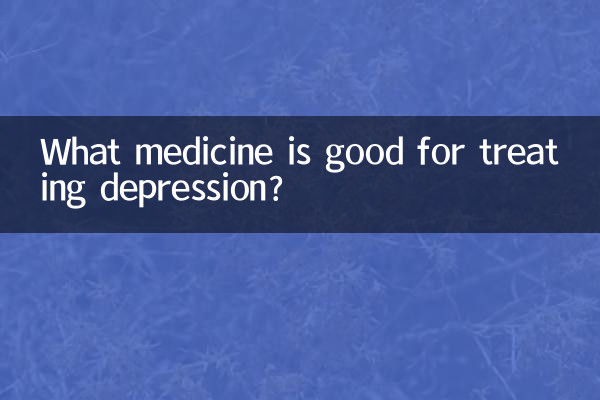What medicine is good for treating depression?
Depression is a common mental health problem that affects hundreds of millions of people around the world. In recent years, with the increase in mental health awareness, the treatment of depression has also attracted much attention. This article will combine the hot topics and hot content on the Internet in the past 10 days to discuss drug selection for the treatment of depression and provide structured data for reference.
1. Common Treatment Drugs for Depression

Treatment for depression usually includes medication and psychotherapy. The following are the antidepressant drugs currently commonly used clinically:
| drug class | Representative medicine | Mechanism of action | Common side effects |
|---|---|---|---|
| Selective 5-HT reuptake inhibitors (SSRIs) | Fluoxetine, sertraline, paroxetine | Increases serotonin levels in the brain | Nausea, insomnia, sexual dysfunction |
| 5-HT and NE reuptake inhibitors (SNRIs) | Venlafaxine, duloxetine | Increases serotonin and norepinephrine levels simultaneously | Headache, dry mouth, elevated blood pressure |
| Tricyclic antidepressants (TCAs) | Amitriptyline, clomipramine | Affects multiple neurotransmitter systems | Dry mouth, constipation, drowsiness |
| Other new antidepressants | Mirtazapine, bupropion | Various mechanisms of action | weight gain, anxiety |
2. Recent hot topics: new developments in the treatment of depression
In the past 10 days, hot topics about depression treatment have mainly focused on the following aspects:
1.New drug research and development progress: A new antidepressant drug called "ketamine nasal spray" has shown rapid onset of action in clinical trials and has become a hot topic of discussion recently.
2.personalized treatment: The topic of genetic testing to guide depression medication has become increasingly popular, and many experts advocate choosing the most suitable medication based on the patient’s genotype.
3.drug combination therapy: There is increased discussion about the effectiveness of multiple antidepressant combinations, especially for treatment-resistant depression.
3. How to choose the right antidepressant
There are many factors to consider when choosing an antidepressant:
| Considerations | Specific content |
|---|---|
| Symptom characteristics | Different drugs have different effects on different symptom groups (such as anxiety, insomnia, changes in appetite) |
| side effect tolerance | Choose drugs with minimal side effects based on the patient’s physical condition |
| drug interactions | Consider other medications the patient is taking |
| previous treatment response | Refer to the patient's past responses to medications |
| economic factors | Consider drug prices and medical insurance reimbursement |
4. Precautions for drug treatment
1.Onset of effect: Most antidepressants take 2-4 weeks to show effects, so patients need to be patient.
2.Medication Adherence: Sudden discontinuation of the drug may cause withdrawal symptoms, and the dose should be gradually reduced under the guidance of a doctor.
3.Comprehensive treatment: Drug treatment should be combined with psychotherapy and lifestyle adjustment.
4.Regular follow-up visits: During the treatment process, it is necessary to regularly evaluate the efficacy and side effects, and adjust the plan in a timely manner.
5. Conclusion
The treatment of depression is an individualized process. There is no "best" drug, only the most suitable drug. Patients should choose an appropriate treatment plan based on their own conditions under the guidance of a professional doctor. At the same time, maintaining good living habits and social support systems are equally important to recovery.
Recent research on the treatment of depression has progressed rapidly, with new drugs and treatments emerging. Patients and their families should maintain confidence, believe in the power of science, actively cooperate with treatment, and ultimately defeat depression.

check the details

check the details